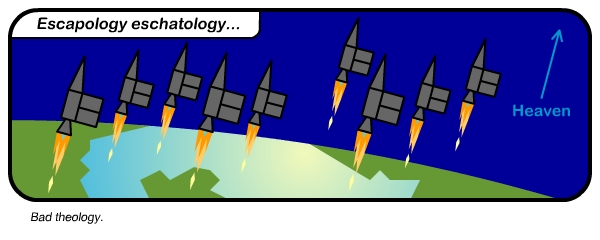 I have Hap to thank for pointing me to ASBO Jesus, Jon Birch’s strange, often fascinating, and frequently very funny comic blog. (I have Birch to thank for the following explanation: “btw. for the non british among you… an ‘asbo’ is an ‘anti-social behaviour order’… the courts here award them to people who are deemed to be constant trouble in their neighbourhoods… presumably according to their neighbours!”) I’ve appreciated any number of his comics, but I especially like this one, because I too have a problem with the whole idea of the “Rapture.” I agree with Birch that it’s bad theology, though we can argue that at another time; more than that, it’s bad exegesis.
I have Hap to thank for pointing me to ASBO Jesus, Jon Birch’s strange, often fascinating, and frequently very funny comic blog. (I have Birch to thank for the following explanation: “btw. for the non british among you… an ‘asbo’ is an ‘anti-social behaviour order’… the courts here award them to people who are deemed to be constant trouble in their neighbourhoods… presumably according to their neighbours!”) I’ve appreciated any number of his comics, but I especially like this one, because I too have a problem with the whole idea of the “Rapture.” I agree with Birch that it’s bad theology, though we can argue that at another time; more than that, it’s bad exegesis.
I imagine that statement will surprise some people, who are no doubt already flipping to 1 Thessalonians 4 to prove me wrong. I can hear them now: “See, it says, ‘The Lord himself will descend from heaven with a cry of command, with the voice of an archangel, and with the sound of the trumpet of God. And the dead in Christ will rise first. Then we who are alive, who are left, will be caught up together with them in the clouds to meet the Lord in the air, and so we will always be with the Lord.’ See, there’s the Rapture right there!” Fine, except . . . it isn’t. Does that text say the Lord will return? Yes. Does it say we’ll all meet him in the air? Yes. But look closely and notice what it doesn’t say: which direction we’ll go from there. The assumption behind the idea of the Rapture is that Jesus will go back to heaven for a while and we’ll go with him—but the Scripture doesn’t actually say that. It’s only an assumption.
Now, I can predict the most likely rejoinder here: “It’s obvious!” Except, once you get outside the assumptions of our culture, it isn’t. To understand what’s really going on in 1 Thessalonians, remember the parallels between this passage and the wedding parables of Jesus. In several places, Jesus compares those waiting for his return to people waiting for the bridegroom. Thus for instance we have the parable of the wise and foolish bridesmaids, in Matthew 25. In that parable, the crisis comes for the foolish bridesmaids when the cry comes, “Here comes the bridegroom! Come out to meet him!” Here’s the parallel to 1 Thessalonians 4: the Lord, the Bridegroom, returns, and we go out to meet him and escort him to the house.
In other words, the coming of Christ Paul talks about isn’t a halfway coming to pick us up and leave the rest of the world to rot; it’s his final return to earth, and we will go out as the wedding party to escort him in. There’s no Rapture in this passage, no “Get Out of Trouble Free” card; only our wishful thinking makes it so.



Well what do you know! You’re back!
So are you! 🙂 Good to see you (as it were). How are you doing?
Hello Rob, (I got here through ASBO Jesus) I agree with what you’ve said,there’s only one other thing i’d want to add. In this passage Paul is not attempting to spell out the process by which Jesus will return, it’s not a specifically prophetic piece of writing in that sense. Instead what’s going on is that Paul is writing to a community who are eagerly waiting Christ’s return any minute now, except it’s been ages, and members of their number are dying which is raising serious concerns as to what will become of them. Thus Paul’s intention is simply to say ‘Jesus will return and it will be dramatic and big enough to deal with the questions you’re asking, have faith.’
andy.
Thanks for the comment, Andy. I think your point is a cogent and important one for understanding 1 Thessalonians. I don’t think that means that his statements will prove inaccurate, however, merely that we have to read them in light of their true point and purpose.